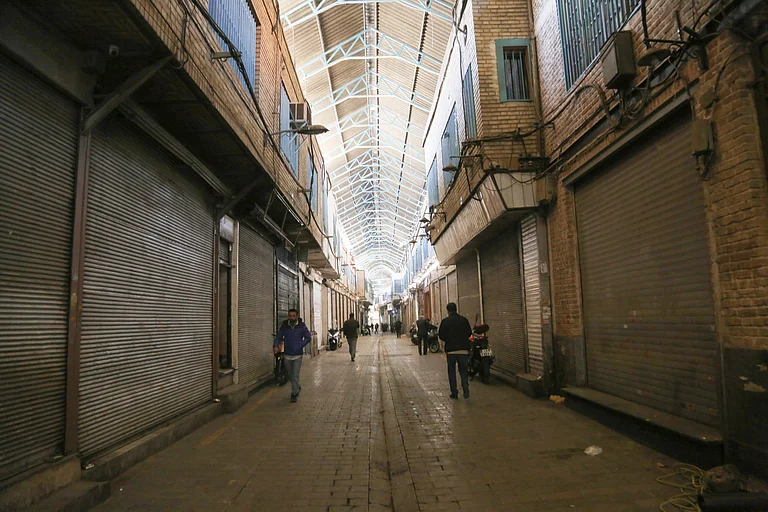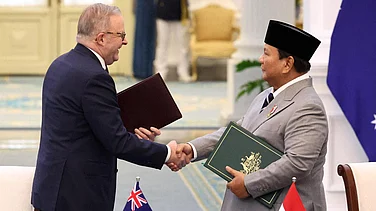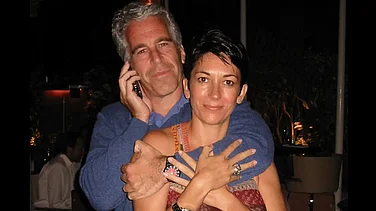A poster circulating on social media platform X (formerly Twitter) has raised concerns by showing an "execution list" of Israeli leaders. The list, allegedly shared by the account @Revenge_is_near, names several prominent Israeli figures, including Prime Minister Benjamin Netanyahu, Defence Minister Yoav Gallant, and the commanders of Israel’s Army, Navy, and Air Force.
The poster, which has not been confirmed by either the Iranian or Israeli governments, suggests that these officials could be potential targets of Iranian retaliation.
Along with Netanyahu and Gallant, other high-ranking military officers are also on the list. These include Chief of General Staff Herzi Halevi, his deputy Amir Baram, and the heads of Israel’s Northern, Southern, and Central Commands—Major Generals Ori Gordin, Yehuda Fox, and Eliezer Toledani. Aharon Haliva, Israel's military intelligence chief, is also named.
According to rumours from within Iranian military intelligence, these Israeli leaders, especially Netanyahu, could be specific targets of Iranian forces. Tensions between the two countries have been escalating for years, with both sides accusing each other of attacks and threats.
Some believe this new development is a direct response to reports that Israel is planning to target Ayatollah Ali Khamenei, Iran’s Supreme Leader, after a series of successful operations against Iran-backed Hezbollah. Israel had recently crippled Hezbollah’s leadership structure, and this list could be Iran’s way of retaliating.
This new threat mirrors a similar move by Israel last month when it published a list of Hezbollah commanders it had killed in airstrikes. The Israeli military named 11 top commanders of Hezbollah’s elite Radwan Force and circulated a poster showing the broken structure of the group’s leadership.
Rising Tensions Between Israel and Iran
Iran targeted Israel after Israeli airstrikes killed two prominent figures: Hezbollah leader Hassan Nasrallah and Hamas leader Ismail Haniyeh. These airstrikes, carried out last Friday, hit several locations in southern and eastern Lebanon that Israel claimed were Hezbollah strongholds.
Hassan Nasrallah, aged 64, had been the leader of Hezbollah for many years, and his death marks a significant blow to the group. Alongside Nasrallah, several senior Hezbollah leaders were also killed in recent Israeli strikes. Notable figures include Nabil Kaouk, a veteran of the 2006 Israel-Lebanon war, and Ali Karaki, another top commander.
Meanwhile, the group Hamas, which is backed by Iran, also suffered a loss. Israeli airstrikes in the southern Lebanese city of Tyre killed senior Hamas commander Fatah Sharif and his family. Another Israeli airstrike hit a residential building in Beirut, killing a member of an Islamic group allied with Hezbollah.
Defence Minister Yoav Gallant Targeted
One of the most significant figures on Iran’s execution list is Defence Minister Yoav Gallant. Gallant has been a key figure in Israel’s military operations, particularly in Gaza. In October last year, he ordered a complete blockade on the Gaza Strip, leading to widespread suffering among civilians. Gallant's controversial statement, referring to Palestinians as "animals," has made him a hated figure among Palestinian supporters and other groups in the region.
In April of this year, Iran launched a large-scale attack on Israel, firing around 200 ballistic missiles and explosive drones. That attack was seen as retaliation for an Israeli airstrike on the Iranian consulate in Damascus, Syria.
This cycle of attacks and retaliation has left diplomats scrambling to prevent a larger conflict. Tehran has warned that if Israel retaliates further, Iran will respond with even more "crushing attacks." Meanwhile, Israel has made it clear that it will not back down. Guy Nir, a spokesperson for the Israeli embassy in India, stated that if Iran provokes a full-scale war, Israel's response would be “strategic and pin-pointed.”
Despite efforts by diplomats in the region to de-escalate the situation, the prospect of peace seems distant. The United States has pledged its support to Israel, warning Iran of severe consequences for its military actions. However, it remains unclear how much involvement Washington will have in brokering peace.
In the meantime, Israel continues to launch airstrikes in Lebanon, focusing on areas believed to be Hezbollah strongholds. So far, nearly 1,900 people have been killed in Lebanon, while over 41,000 people, including women and children, have died in Palestine due to Israeli strikes.



























